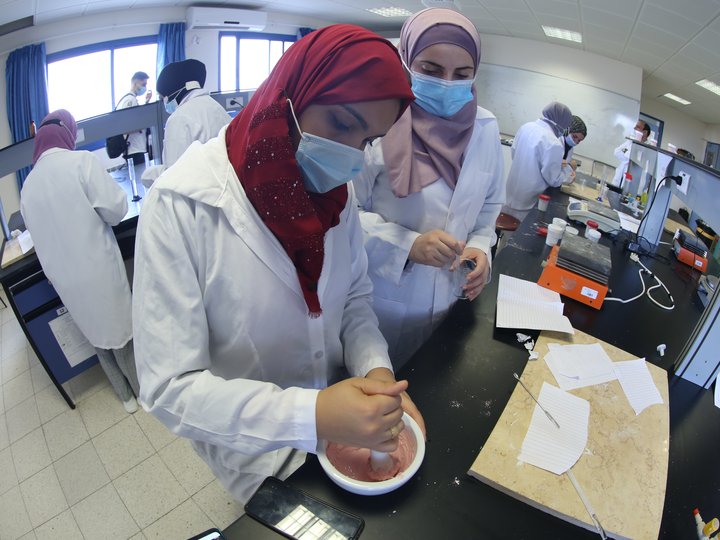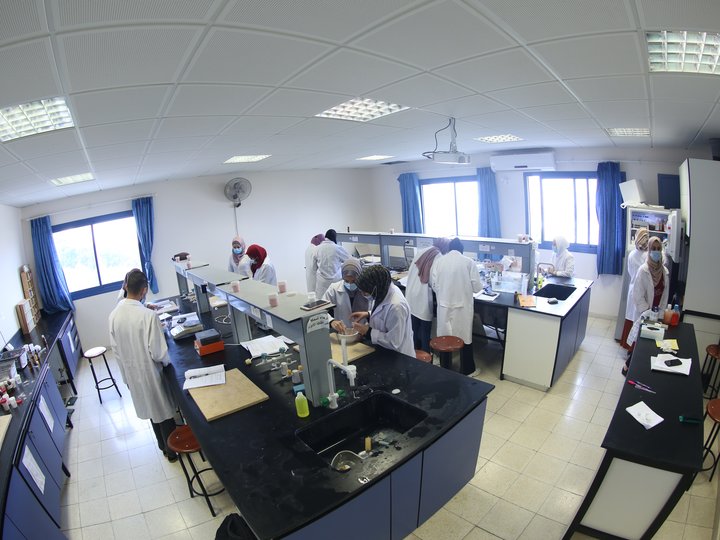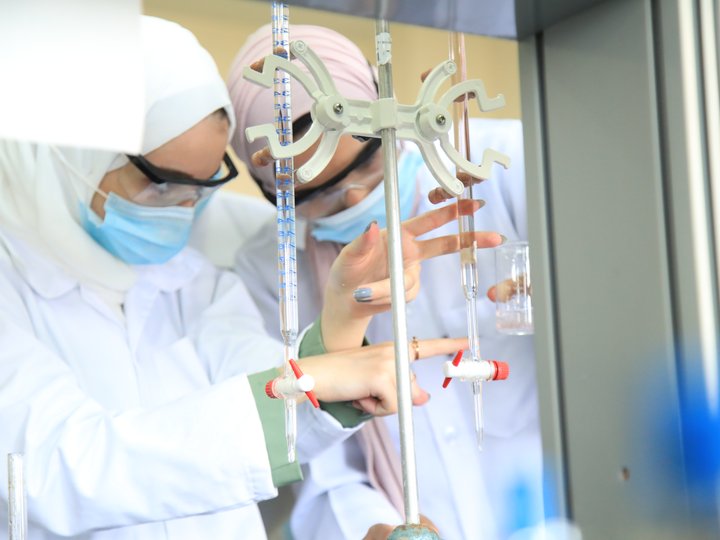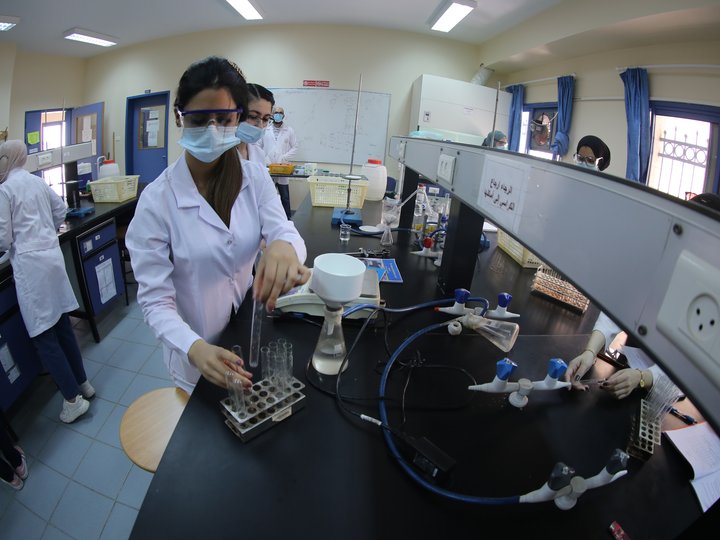
The students learn how to prepare various pharmaceutical dosage forms such as solutions, suspensions, emulsions, ointments and creams, suppositories and capsules.
Equipments
- Compounding Tools : Mortar and pestles, ointment tiles, basins, a various glassware.
- Manual Capsule Filling Machines.
- Suppository Molds.
- Analytical And Electronic Balances.
- Manual Tableting Machine.


The students perform experiments on solubility, diffusion, thermodynamics, study of distribution phenomena, adsorption and interfacial phenomenon, drug degradation kinetics, and drug dissolution.
Equipments
- Spectrophotometer.
- Viscometer.
- Dissolution Apparatus.
- Disintegration Apparatus.
- pH Meters.
- Titration Setup.
- Water Baths.
- Hot Plates.
- Balances.
- Separator Funnels.


This lab aims to provide pharmacy college students the knowledge to recognize medicinal plants micro and macroscopically which they need them for their works in hospitals, ministry of health (drug registration department), and useful in the pharmaceutical industry. This lab also aims to teach students some of practical skills in phytochemical extraction and identification of medicinal plants by many instruments.
Equipments
- Microwave apparatus for the extraction of essential aromatic oil.
- Shaker.
- Evaporator.
- Freeze dryer.
- pH meter.


This lab demonstrates the principles learnt in the analytical chemistry course. The lab is divided into 14 sessions that demonstrate chemical analysis using titration and the principles of measurements in science.
Examples of the experiments include the analysis of some drugs according to pharmacopeial methods such as the determination of aluminum and magnesium hydroxides in antacids, determination of iron content in medicines using reduction-oxidation titrations.
Equipments
- Titration set ups.
- Ph meters.
- Analytical balances.
- Water baths.
- Various glassware.
Instrumental Analysis Lab
This lab is an application of the theoretical materials in the instrumental analysis course. Students conduct the analysis of various medicinal substances using compendial methods, such as the analysis of vitamin B12 content, measurement of glucose levels, determination of the acidity constant of weak acids and measurement of ph.
Equipments
- Spectrophotometer.
- Polarimeter.
- Flame Atomic Emission.
- High-Performance Liquid Chromatography (HPLC).


In this lab, students perform the experimental work for their graduation projects or small research projects assigned by faculty members. It is used by both undergraduate and graduate students and supervised by a lab technician to assist the students in their work.
Available Instruments:
- Centrifuge.
- Sonicator.
- Rotary Evaporator.
- UV Visualization.
- Vortex Mixer.
- Incubator.
- Cell Counter.
- Laminar Flow Hood.
- Autoclave.
- pH Meters.
- Balances.
- Microscopes.

Industrial Pharmacy Lab aims to provide students with a clear idea of pharmaceutical dosage forms and its preparation techniques, linking academic principles with practical areas in drug manufacturing. Furthermore; It enhances a hands-on experience and practice similar to what is already required in the pharmaceutical manufacturing companies.
This lab allows students to practice in detail the manufacturing procedures of some dosage forms from dispensing step to the last one of obtaining the final product including all requirements to fulfill each step of processing. it also provides students with sufficient experience in performing several quality controls tests as dissolution, disintegration, hardness, friability and weight variation.
Instrumental analysis for pharmaceutical products is aimed to train students on some of the most advanced and recent analytical methods which are used for the analysis of drugs, major ions and trace elements. The course include training sessions will include working on instruments such as: UV/Vis spectrophotometry, HPLC, Flame atomic emission Karl Fisher, Potentiometry and Coulmetry. The experiments of this laboratory are designed to analyze drugs and pharmaceutical products applying approved analytical methods by international pharmacopeias. The students are also trained on apply concepts such as accuracy, precision and good laboratory practice (GLP) throughout the course experimental sessions.
- Practical Hair and Nail Care Products: This course offers students foundational knowledge and practical skills in formulating and compounding diverse hair and nail products. Topics encompass the creation of items like shampoos, conditioners, styling products, hair colorants, waving and relaxing products, as well as grooming essentials like shaving products, depilatories, and treatments for hair loss. Additionally, the curriculum includes the formulation of various nail products, including cuticle remover, cuticle softener, nail bleach, nail varnish, and varnish removers.
- Skin Care and Cleansing Lab: This hands-on course is designed to provide clinical training for students, enabling them to develop practical skills in discerning various skin types. Participants will gain the necessary practical knowledge to identify and differentiate skin types, including oily skin, combination skin, inflamed skin, and skin affected by systemic diseases. Moreover, students will learn how to effectively advise patients on suitable treatments based on their individual skin evaluations. The course also explores the clinical correlation between facial treatments and chronic skin conditions.
- Skin Care Products I Lab: This laboratory course is designed to equip students with the requisite knowledge and skills for formulating a range of cosmetic skin products. Students will delve into the formulation of protective creams, skin peeling products, face cleansers, cleansing creams, moisturizers, day creams, night creams, as well as hand and body creams. Through practical hands-on experiences, participants will gain a comprehensive understanding of the formulation processes involved in creating these cosmetic skincare products.
- Practical Skin Care Products II : Building upon the foundation established in the preceding preparatory course, this advanced module is tailored to further enhance students' knowledge and skills in formulating and compounding specialized preparations. Topics covered encompass the intricate processes involved in creating sunscreens, skin tanning products, skin lightening solutions, as well as antiperspirants and deodorants. Through a combination of theoretical insights and hands-on practice, students will deepen their understanding and proficiency in crafting these specific formulations.
- Raw Materials for Cosmetics Lab: In this course, students will delve into the fundamental principles underlying the production of both natural and synthetic cosmetic active ingredients, as well as the raw materials integral to cosmetic formulations. The curriculum will encompass the preparation of essential components such as solvents, emulsifying agents, waxes, whitening agents, and sun light absorbers. Through a combination of theoretical insights and practical applications, participants will acquire a comprehensive understanding of the manufacturing processes involved in creating these crucial elements for cosmetic preparations.
- Practical Perfumes and Essential Oils Products : This hands-on course is designed to impart fundamental practical knowledge and skills to students in the art of extracting essential oils across various types. Participants will also gain proficiency in crafting a variety of aromatic products, including toilet water, cologne water, splash cologne, and after-shaving perfumes. Additionally, the curriculum encompasses the creation of inhalation products featuring essential oils and the formulation of air fresheners. Through a combination of theoretical instruction and practical application, students will develop a comprehensive skill set in the extraction and preparation of diverse aromatic products.
